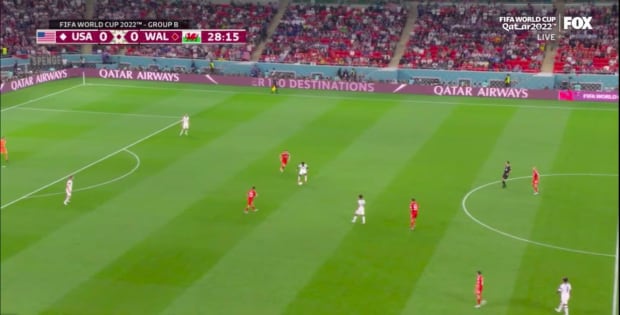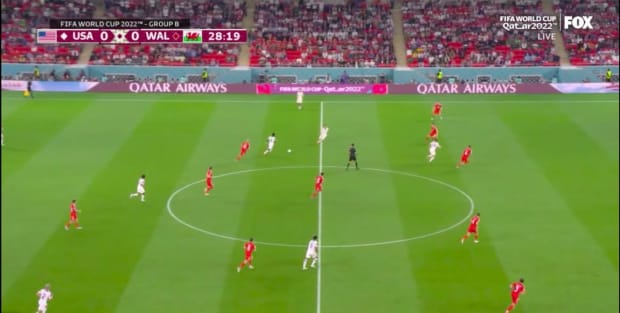Often called the engine room, the battle between central midfielders is frequently where games are decided. Everything flows or sputters through the players in the middle.
Like an improv jazz band, a midfield needs components that can feel out the rhythm of play, knowing when to pull back and when it’s time for a solo. But it also isn’t complete without distinct pieces. After all, a group of three drummers doesn’t create the same harmony as one with a saxophone and trombone.
In Weston McKennie, Yunus Musah and Tyler Adams, the United States has three midfielders that understand their unique roles. It’s a symbiotic relationship, each player utilizing his own distinct strengths to create a trio that dominated its three World Cup group-stage matches.
Start with Musah. The 20-year-old Arsenal academy product moved to La Liga’s Valencia at 16 and became an important player for the club just a year later. He’s slippery in possession, with the ability to drop a shoulder and beat defenders on the half-turn or use his pace to skate by flat-footed opposition. It’s a crucial element of an attack for a U.S. team that prefers playing out from the back over a more direct style. Opposing midfields are forced to choose between dropping off and allowing him space or gamble by pressing.
His knack for jump-starting attacks was on display early against Wales. Musah dropped into the space between the forwards and midfield to pick up the ball from Walker Zimmerman and drove right at the Welsh midfield.

Courtesy of Fox broadcast
He used his pace to glide past two defenders and force the Welsh to turn toward their own goal.

Courtesy of Fox broadcast
Musah was again excellent against England, but what was perhaps his best performance came in the group finale vs. Iran. The U.S. knew Team Melli would try to live on the counter. Musah and the midfield were ready. Time and time again, he cut off passing lanes, slid in behind the U.S. fullbacks to stifle counterattacks and then launched attacks of his own, finishing with a team-leading four tackles. The best display of what he adds going forward came in the 52nd minute.
Iran had just created one of its best scoring chances of the game, a header sent over the bar. The pressure was on. So McKennie dropped deep to pick up the ball and Musah found space behind a defender, received a pass and sent another defender packing with a filthy combination of stepovers.
It’s difficult enough to stop a lone press-resistant player carrying the ball through the midfield. McKennie, typically lined up opposite Musah, presents his own problems for a defense. A true box-to-box midfielder, his versatility is what makes him difficult to handle. He became a starter at Juventus before an injury threatened his World Cup status. McKennie’s first game back, the opener against Wales, wasn’t his strongest, as he was returning to fitness. He followed it with a gem against England playing a slightly different role than he’s used to.
Manager Gregg Berhalter opted for a 4-4-2, with Christian Pulisic and McKennie as the wide players in midfield. McKennie’s combination play with right back Sergiño Dest and winger Tim Weah was superb. Critically, he helped control the tempo of the game in the first half when the U.S. dominated proceedings. Clever flicks to Dest and attempted line-breaking passes to Weah were mixed in with recycling the ball back to the back line.
McKennie completed an efficient 30 of his 35 passes against the Three Lions. But he’s known for his flair—the red, white and blue streaks in his hair and use of a photographer’s bib to wipe his hands during a match are small displays of his lively attitude on the pitch. And the U.S. needed his flair—and forward thinking—to kick start what’s been a stop-and-go attack at times.
McKennie consistently looked to send the speedy Dest in behind against Iran. He missed on the first attempt over the top early on, and on the second, the right back found space, and McKennie curled in a perfectly weighted lob over the Iranian back line. Dest headed it into the box, Pulisic slotted it home and the rest was history.
Minutes after that goal, McKennie played Weah in for what appeared to be the U.S.’s second goal before it was flagged for a tight offside. But that desire to put pressure on a defense from the midfield got the U.S. into key attacking moments: He recorded the most progressive passes of any American against England (four) and Iran (seven).
Like Musah, McKennie will also drop in behind the fullback to allow them to occupy space high up the pitch. Both Dest and left back Antonee Robinson play important roles in the U.S. attack bombing down the wings. But they can’t do it without some cover. And the ultimate cover comes from Adams.
Few players have announced themselves on this global stage quite like the Leeds midfielder. The U.S.’s captain has had a nice start to his Premier League career after making the move over to Yorkshire from Germany’s RB Leipzig this summer. He’s been on another level in Qatar.
Adams is the energy that makes this machine run. In the attack, he typically sits at the base of the midfield and plays the role of distributor. Often, he slots in between the two center backs, another rotation that allows Dest and Robinson to advance into dangerous positions.
Out of possession is where Adams is elite. He shadows opposing midfielders and forwards to snuff out potential counterattacks before they begin. He was at his best against an England team with loads of talent up top. Adams made life incredibly difficult for Mason Mount and Jude Bellingham trying to advance the Three Lions’ attack. Numerous times, he stuffed an attempt to get out in transition and started an attack of his own.
His time for a solo show arrived in the 52nd minute. Pulisic gave the ball away, and danger loomed as Bukayo Saka took up space behind an advanced Robinson. Adams calmly sprinted back into Robinson’s spot, made a brilliant tackle in the 18-yard box and proceeded to shout at Pulisic for his moment of carelessness.
Any team has a distinct advantage when the linchpin of its defense has no issue chasing down any attacker, running down any loose ball. That Adams covered the most distance of any player in the match against Wales (8.2 miles) and Iran (8.0 miles) is a testament to both his elite work rate and fitness, forged in the flame of the nonstop press of RB Leipzig and Jesse Marsch’s Leeds. He’s played all but one match with his club this season and played every minute of the group stage, yet appears to never tire.
The trio has passed each test it’s been presented with so far. Saturday, it faces a Netherlands midfield that mixes experience with star Frenkie de Jong. If the U.S. has any hope of an upset that secures a return to the quarterfinals for the first time in 20 years, it’ll need its engine room to make magic once again.







